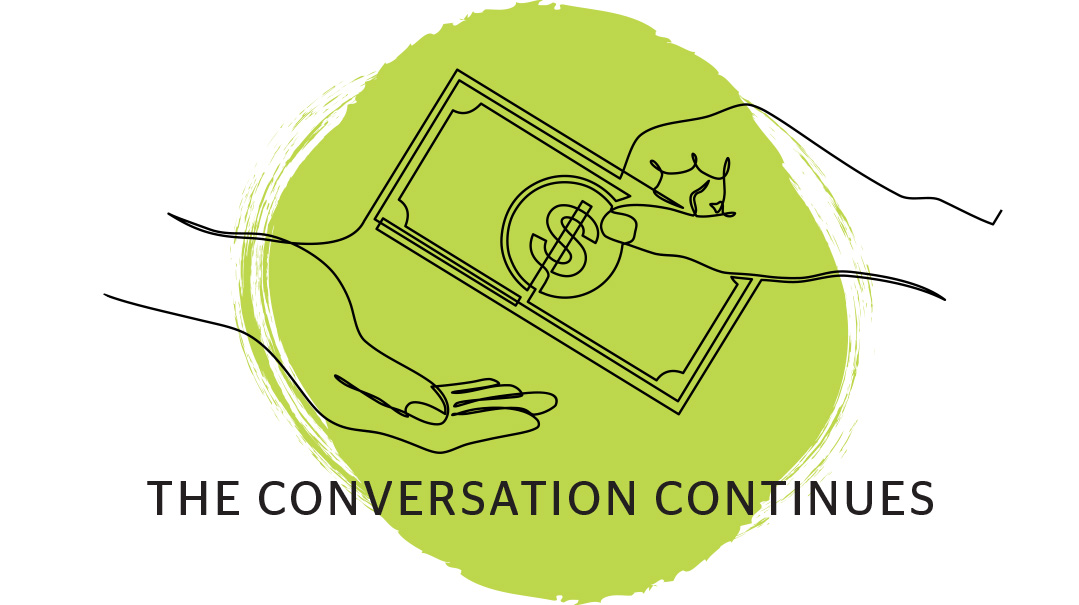All Accounted for: The Conversation Continues

Parental support: readers share their takes

Please Don’t Assume
Chaya Gitson
I didn’t participate in the support poll, because it didn’t pertain to me: I didn’t receive any financial support. But when you’re in kollel, support is almost a given, and I want to touch on that.
I made the decision to support a husband in kollel even though I knew it would mean I’d need to work hard. With both parents in chinuch, I didn’t expect support. But I wanted the life of Torah, and I was willing to sacrifice to make it work.
So many people assumed I was supported, though — and felt that this gave them license to comment on my lifestyle. When I bought myself a new bag, my coworker commented about how comfortable it must be to receive support and be able to buy nice things. A friend asked me outright how my rent is paid: Do my parents write the check to the landlord or do they give it to me so I can pay rent from my own account? Even as my family grew and I began paying tuition, random acquaintances would speculate — to my face — about my tuition breaks and support and how the two of them together enabled me to treat my kids to pizza.
Looking back, I think the reason this so upset me is that for me, kollel was life, not a stop on the way. I made the conscious decision to travel this road, and the thoughtless comments from friends didn’t reflect that.
I guess my point is that while kollel has become widely accepted because of parental support (and this a good thing; I think everyone should start married life with a strong Torah foundation!), please don’t assume support. For some, there’s more to it.
A Mitzvah and a Privilege
J. Lipshutz
Your poll about supporting one’s children sparked much discussion. We supported our children — some more, some less, depending on our means at the time. But your poll presupposed the notion of “support,” and indeed, in our society, the idea exists.
In a vacuum, it is certainly more desirable and healthier for an adult to earn his own parnassah. Rabi Akiva enjoins us to be sparing even with our Shabbos expenses in order not to have to be the recipient of charity. Mishnayos in Pirkei Avos extol the great virtue of working for a living. The Torah bids us to leave our father and mother, to get married and build our own families. The Rambam instructs us: “A person should pressure himself, even enduring pain, in order not to make himself dependent upon others for his support” (Matanos Aniyim 10:18). In Bircas Hamazon we pray not to have to be dependent upon the gifts of mere flesh and blood.
But from my perspective as a parent, it looks a little different. Is my child sitting in kollel developing into a talmid chacham? Is it not then my greatest privilege and joy to participate in this by offering financial support? L’havdil, if my child is attaining the education needed to become a doctor or a dentist or an accountant or a lawyer, is this not also a legitimate reason to provide financial support? Kiddushin 29a adjures parents to teach their children a trade; this, too, is a mitzvah.
And then there is the extremely important mitzvah of giving tzedakah to those in need. A person who requires tzedakah must accept it. The Rambam teaches that those truly in need of tzedakah who refuse to take are compared to one guilty of bloodshed! (Matanos Aniyim 10:19). From the giver’s perspective, one should “trick” the needy into receiving tzedakah if it is needed but refused. Does this not include sons and daughters? The Rambam writes: “He who furnishes sustenance for his older sons and daughters... this is considered tzedakah. And it is the greatest tzedakah, because it is to his closest relatives.”
As a society, is “support” sometimes taken too far? Of course. Do some children come to rely on the support to the point that they lack the motivation to fend for themselves? Yes. But as a parent, whether I’m supporting my child because I want a cheilek in his Torah, or because I am helping him attain a profession that will enable him to be financially stable, or simply because he is struggling and needs tzedakah, giving to my child is a mitzvah and a privilege.
Bump in the Road
Name Withheld
When we got married, my father and father-in-law made a commitment to support us for five years. Receiving support is a tremendous gift. I don’t take that lightly. Between the two of them, my husband and I covered more than half our living expenses (and I filled in the rest).
We knew that we could rely on a certain amount, but it was up to us to spend it wisely. I didn’t see it as so different from receiving a salary. My husband was being paid to do what he does every day, but instead of receiving a paycheck from a boss because he works a job, he got a bank transfer from our parents because he’s sitting in kollel. We still needed to have the tough money conversations between ourselves.
Did we want to have steak every night? Sure, we could do it — but then we’d have to move into a machsan with no air-conditioning.
A few years after we married, my father-in-law reached out to say he needed to stop our support. It came as a huge surprise. Our parents had mentioned that our support was subject to change, but that’s just the thing people say to be responsible and safe. We didn’t expect it would ever happen.
My father-in-law owned a very successful company. There was no reason to expect his income would change. But apparently there’d been some internal shuffling at the company, and my father-in-law no longer owned any shares. His steady income — and our steady support — was gone.
If I’m being honest, it felt a little unfair. We’d been counting on that.
Our father-in-law gave us six months’ notice, which meant we had six months to work out what we were going to do. My husband and I had no plans for him to leave kollel, so we were just going to find a way to make it work.
One night, we finally sat down to crunch the numbers. Our landlord had just raised the rent again, so we needed to work it all out. What were our sources of income? How much could we cut back?
At the time that we were married, my husband put his meager kollel checks into a separate account. When he wanted to buy me a present, he pulled the money from there. That account was designated for gifts. When we looked at that account’s balance, we realized: My husband had saved enough to cover the exact raise in our rent for one year.
“We’re gifting ourselves another year in Israel,” my husband said. Then we went to sleep with a plan.
At least our rent was covered. The rest of the gaps would hopefully be doable, too.
It’s been a few months, but, baruch Hashem, we’re making it work. I’ve learned to change some of my habits. I used to fall back on takeout as an easy dinner, but now I’ll make scrambled eggs instead. I’ve always actively chosen to use the times when money feels tough as opportunities to develop my bitachon on a deeper level than I ever could have before. I’m learning that the only way you get money in your bank account is because Hashem deposits it there — not my boss, not my clients, not our parents.
This bitachon work is excruciating. I’ve spent weeks crying over it. When you let go of security, it’s terrifying.
There are times when I don’t feel Hashem’s embrace and feel pressured about our bills, but we’re still choosing to do this on our own, and He’s still helping us do it.
Silent Partner
Rabbi Avrohom Weinrib
I read with great interest your polls regarding support and the comments that came along with it. One thing numbers and polls don’t reflect is the emotional component of support.
First, there’s the partnership aspect. Supporting our children after their marriage is vitally different than the support we give them as children growing up in our homes. When they were still part of our households, we would buy them clothes, prepare their food, and provide a roof over their heads.
When they get married and leave our homes, the dynamic switches. It is no longer a one-sided endeavor of endless giving. With adult children, the relationship is now one of a partnership. If they are learning, we are partners in that holy endeavor. If we help pay for their for schooling, we are partnering with them to bring them to independence. And if we help out with their baseline finances or just give some extras, we are a partner in the beautiful home they are building.
Seeing this support as a partnership allows us to connect to our children who are living independent lives, in a most meaningful way. And a key to making this partnership successful is being a silent partner. A silent partner is one who invests in a company but fully trusts those running it to make sound decisions. Trust the decisions of your children — and at the same time, be aware that they will likely make mistakes in the process. But while an investor may pull his investment when he sees mistakes being made, that’s where the analogy ends. With our children, we need to realize that mistakes are part of the learning process, and allowing them to navigate the situation on their own is the greatest gift you can give to them.
The second point is one I have heard many times over the years from parents. Children who receive support are generally unaware of the tremendous sacrifice that is being made by their parents. Let me be clear. No one wants to give more than parents to their children. But at the same time, a large percentage of the parents who are supporting their children don’t have that extra cash sitting around in the bank. That means something else is giving for that support to happen, and that takes sacrifice. But because the children receiving the support are unaware of the sacrifice being made, they are unable to adequately express their appreciation for what they are getting. Understandably, that can lead to the parents feeling underappreciated for the great sacrifice they are making.
So a word to the children out there: Your parents might be thrilled to be helping you, but be aware that it likely is not so simple to do so. Being expressive to them every time you receive that check and telling them just how appreciative you are, goes a long way in showing how much you are aware of what they may be giving up. And even if it doesn’t seem that any sacrifice is being made, giving away something that belongs to you is always a sacrifice. And that sacrifice needs to be acknowledged through an appropriate medium of hakaras hatov.
May all of us on either side of the support chain (and some are on both) reap the beautiful rewards that can and should result from this special partnership.
Living the Dream
On Our Own
Kollel is a sacred time.
You don’t need your parents’ support to make it happen.
When my husband and I were engaged, “should we or shouldn’t we?” was the biggest recurring conversation. Both of us were much older, so by the time we met, my husband had left the beis medrash long before, and settled into a job.
All the while, though, it was still his dream: to go to kollel once he married.
It was my dream, too, even though, as the years passed, it seemed more and more unlikely. On my end, I didn’t think I’d find the kind of guy willing to do it. Because I was already “older,” most guys I went out with were already working. I doubted someone would be willing to leave a job and go back to learning full-time.
On his end, how would he give up a generous salary for a meager stipend? How do you go from a steady income to sporadic, tiny checks? Was it even responsible?
We got engaged knowing neither of our parents would be supporting us financially — and with no idea of what our plan would be.
“Is it crazy to go to kollel?” my chassan asked soon after our l’chayim.
“A little — but is that a reason not to do it?”
We had this conversation over and over again.
My salary was a tiny fraction of his. It would cover our expenses — tightly. If we lived off that alone, it would be hard. I’d have to work full-time, and we’d have barely any leftovers for extras.
His salary would cover everything and more. We’d be able to save for a house, treat ourselves on a regular basis, and fit in some travel. We wouldn’t have to calculate grocery receipts or spend three days deciding which new washing machine we could afford.
Should we? Shouldn’t we?
We both wanted to, so we decided to just try. Six months and see what happens. Maybe we could make it work, maybe we couldn’t — but we wouldn’t know until we had boots on the ground.
A week before our wedding, my husband left his job and paycheck. Baruch Hashem, we’re still a kollel family.
I don’t take a single day for granted. Every morning that my husband leaves to kollel is a brachah. I work more hours than I’d like to — but he’s sitting and learning. We can’t always afford to travel for simchahs — but we’re living the dream. We weren’t sure if it would be possible, but we’re making it happen on our own (and with huge support from the One Above.)
If your support is running out — or if you’re not expecting any at all — you don’t have to move on. Give yourselves a chance. You might just be surprised how long you can make it happen. Another three months, six months, ten years…? Hashem’s on your side for every minute of it.
(Originally featured in Family First, Issue 827)
Oops! We could not locate your form.




